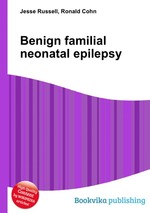Benign familial neonatal epilepsy
Jesse Russell Ronald Cohn
бумажная книга
High Quality Content by WIKIPEDIA articles! Benign familial neonatal epilepsy (BFNE), formerly called Benign familial neonatal convulsions (BFNC) or Benign familial neonatal seizures (BFNS), is a rare autosomal dominant inherited form of epilepsy. It manifests in newborns, normally within the first 7 days of life, as tonic-clonic seizures. Infants are otherwise normal between attacks and develop without incident. Attacks normally spontaneously cease within the first 15 weeks of life. Lifetime susceptibility to seizures is increased, as 16% of those diagnosed with BFNE earlier in life will go on to have seizures versus a 2% lifetime risk for the general population. There are three known genetic causes of BFNE, two being the voltage-gated potassium channels KCNQ2 (BFNC1) and KCNQ3 (BFNC2) and the third being a chromosomal inversion (BFNC3). There is no obvious correlation between most of the known mutations and clinical variability seen in BFNE.


